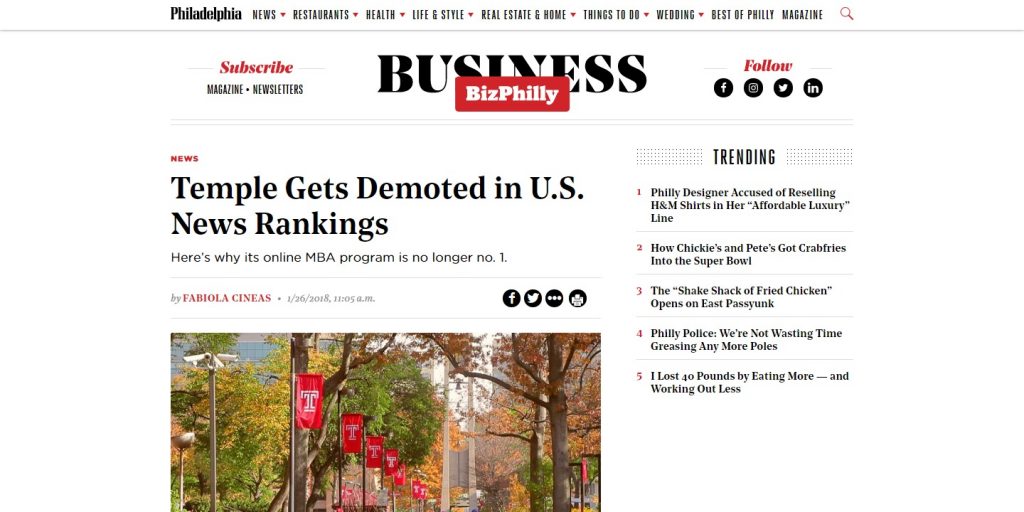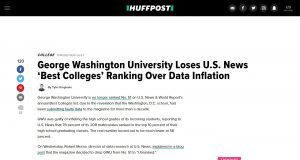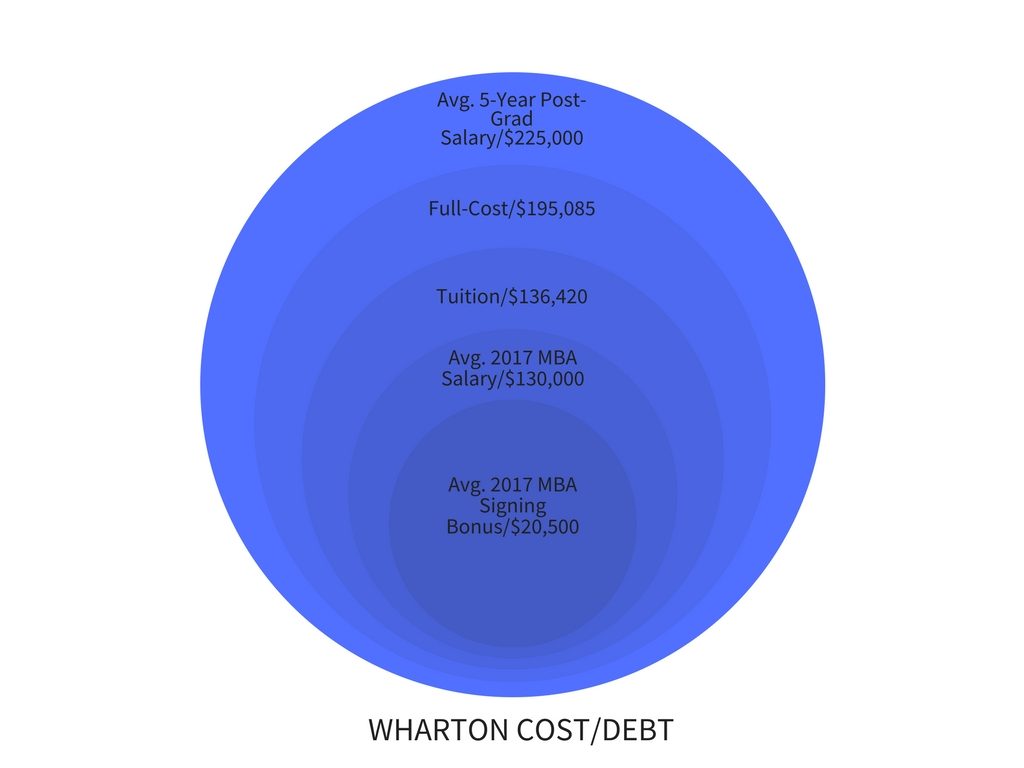Caught: Why Business Schools Might Lie to Improve Rankings

School rankings from sites like Forbes or U.S. News & World Report are often a crucial factor for students before they decide where they should pursue a degree. Using a combination of rankings, standardized test scores, job placement after graduation, and tuition costs, among other crucial factors, a school ranking a quick and succinct look at the relative merits and weaknesses of MBA programs throughout the country—and the world.
There is a lot riding on these rankings: not only do perspective MBAs often make decisions about where to pursue their degree based on these reviews, but graduates can use these rankings to demonstrate the quality of their degree to future employers. With such high stakes, organizations like U.S. News that compile these rankings rely on the accurate reporting of data from each business school.
So, what happens if the information is inaccurate, or worse? Data like student satisfaction and post-graduate salary—which can be so crucial in informing a prospective MBAs choice of school or program—is reported directly from the business schools, which often presents a conflict of interest potential. With so much at stake, would a school ever lie to increase their spot in the ranking?
Unfortunately, it seems the answer is yes. Just last week, the Online MBA program at Temple University’s Fox School of Business—a program that was consistently ranked in the top spot in U.S. News’ Online MBA ranking—vanished from the list. According to the initial announcement, new information had revealed that just 20 percent of Fox students in the Online MBA program had actually submitted test scores, a number that had initially been reported at a perfect 100 percent. Since the formula used by U.S. News weighs test score averages more if over 75 percent of students have submitted them, this inaccurate reporting from Temple Fox would have given the program an undeserved boost in the school ranking.

In the wake of Temple’s removal, questions continue to arise about the lengths schools go for good rankings/Photo via PhillyMag.
In the days since the initial announcement of Temple’s removal from the ranking, even more questions came out regarding the accuracy of Fox’s data. Further investigation found that Temple had reported 100 percent of students taking standardized admissions test for every year since 2014—a suspicious jump from the 25 and 33 percent that had been reported in the years prior. Since the test scores data submitted turned out to be inaccurate, it seems wholly possible that the data had also been misreported for the three years prior; the same years that Temple Fox held the top ranking for Online MBA programs.
This isn’t the first time it’s been discovered that business schools and even undergraduate programs have falsified or reported inaccurate data to boost its rankings. In 2013, Forbes was forced to remove four schools from its ranking of “America’s Best Colleges” due to inaccurate reporting: doctored SAT results from Bucknell University, false acceptance and graduation rates from Iona College, among others. In 2012, George Washington University lost its ranking on U.S. News’ “Best Colleges” list when it was discovered they were inflating the high school grades of their incoming students.

GWU was one of several schools in the past few years to submit false data for a rankings boost/via Huffington Post.
The problem may be even more far-reaching than some may suspect. In 2013, a survey of 576 college admissions officers found that 91 percent believed other colleges to be guilty of falsely reporting their admissions data. Even the school ranking creators themselves are shocked by this trend. In 2013, U.S. News editor Brian Kelly commented, “The integrity of data is important to everybody … I find it incredible to contemplate that institutions based on ethical behavior would be doing this.”
In 2005, the Association to Advance Collegiate School of Business (AACSB) took a deep look into this trend to examine why the issue of falsifying business school data might be so widespread. “Because rankings of full-time MBA programs are commonly presented under the label of ‘best b-schools,’ the public has developed a narrow definition about the breadth and value of business education,” the report states. Since most media rankings don’t consider factors like faculty research or doctoral education, MBA programs have become more likely to invest in more visible aspects of the program, such as facilities and marketing campaigns, which don’t actually deal with the quality of the degree. As a result, even high-quality programs may earn a lower media rank than they deserve based on the factors considered, adding pressure to do what it takes to earn a school ranking that matches what they perceive as the quality of the degree.
“Plenty of people apply to a school because it has reached the summit of a ‘best-of’ ranking, just as many people will see a movie or buy a book after it wins an award. That’s human nature,” Columbia Business School dean Glenn Hubbard told Fortune. “We want to experience the best.”
Whether or not placement in a school ranking truly represents the quality of a degree, it’s easy to see why the pressure is on for many admissions departments. A better school ranking can increase the number of applicants, providing for a more competitive, and diverse applicant pool, which creates a better quality admitted class. The cycle continues: success of these graduates can improve the possibility of future funding, providing more resources for the program and encouraging even more applicants to apply down the line.
“Rankings have become omnipresent in higher education, and they have enhanced the competition among institutions,” said Terry W. Hartle, senior vice president at the American Council on Education, in 2013. “And in any highly competitive environment, there is always a temptation to cut corners.”
For now, the Fox School of Business has been removed from the U.S. News Online MBA ranking. Concerns about false data continue to be evaluated, as organizations like AACSB continue to seek solutions and make recommendations for best practices when it comes to the collection and reporting of admissions data. In 2017, the AACSB publication “On Academic Rankings, Unacceptable Methods, and the Social Obligations of Business Schools,” suggested that schools and organizing bodies work together to find a method of data collection that includes “transparency, interpretability, and the empowerment of individual decision makers by whatever criteria truly suits their individual needs.”
For prospective students, its important to acknowledge this troubling but widespread trend as they make important decisions about where to earn a degree. While school ranking remains an easy way to compare programs against each other, students should consider not just the accuracy of the data but also the kind of factors reported in media rankings. While it seems possible that the number one program in a media ranking may not truly deserve that position, the real top program- the best for each individual’s needs and career goals—will always deserve first place.
Here Are the Front Runners For Amazon’s New HQ2 Campus

Last week, 20 cities in the United States and Canada were informed by Amazon that their bid to host the tech giant’s second headquarters, HQ2, was still being considered. Continue reading…
20 Cities Survive Amazon HQ2 Shortlist

Four months after Amazon announced plans to construct a second headquarters, North American cities have been making grandstanding pleas in order to court the ecommerce behemoth. New York City’s mayoral office lit up the Empire State building with Amazon’s glowing orange hue in a symbolic gesture, while certain cities like Chicago went the more extreme route, proposing laws that could funnel income taxes directly back to the company. After much speculation, here is the official Amazon HQ2 shortlist:
- Atlanta
- Austin
- Boston
- Chicago
- Columbus, Ohio
- Dallas
- Denver
- Indianapolis
- Los Angeles
- Miami
- Montgomery County, Md.
- Nashville
- Newark
- New York
- Northern Virginia
- Philadelphia
- Pittsburgh
- Raleigh, N.C.
- Toronto
- Washington, D.C.
Unsurprisingly, most of the cities that made the cut were among the largest in North America, with only one Canadian city—Toronto—left standing. Over 230 cities from the U.S., Canada, and Mexico made official bids for the company’s second headquarters, with Amazon prioritizing tech-centric metros of populations larger than 500,000. In fact, only four of the 20 metro areas—Miami, Nashville, Newark, and Pittsburgh—have a population of less than half a million, with Newark being the smallest of the entrants. Notably, Newark offered perhaps the largest financial incentive to the company, proposing upwards of $7 billion in tax incentives.
How the Amazon HQ2 shortlist was formed is not totally known, according to the New York Times:
“According to people briefed on the process who would speak only anonymously because the deliberations were private, the process was conducted by a team of about a dozen people within Amazon, including economists, human resources managers and executives who oversee real estate. Jeff Bezos, Amazon’s chief executive who was the mastermind behind turning the search into a public process and coined the term “HQ2,” was also involved, the people said.”
At the time of the initial announcement, Amazon released a stream of positive economic statistics about its impact in Seattle, home to the original headquarters. The company stated (although these statistics are still not yet verified by any source outside of Amazon) that it added $38 billion USD to the value of the city from 2010-16 alone, due to its investments and rapidly expanding workforce. Detractors argue that the financial value added to the city did not positively impact the quality of life, however, with more than 51 percent of Seattle residents making less than $50,000 per year and more than quarter of city residents earn less than $25,000 per year. The influx of high-level employment also contributed to rapidly rising housing costs and poorer traffic.
Experts from CNBC believe that Raleigh might be the front-runner of the remaining entrants, which matches the initial bid criteria the most. Although some speculate that Austin most aligns up with Amazon’s future. The company declined to announce when the final decision will be made.
What Amazon Means For MBA Students
Not so secretly, Amazon has become one of the world’s largest MBA recruiters, hiring students from top schools all over the world. We’ve previously outlined the details of why it has become such an attractive destination for business school students.
The company creates a direct pipeline from its MBA internship program to full-time employment, which should rapidly increase with the creation of HQ2. In a previous interview with the Financial Times, Miriam Park, the Amazon Director of University Programs, highlighted the company’s recruitment strategy:
“The Amazon recruitment process is designed to ensure we hire top candidates with high-growth potential whatever their background may be. As part of this we recruit current MBA students and MBA alumni for permanent and internship opportunities worldwide and see MBAs as an important part of our leadership development. We value people who can balance long-term strategic thinking with tactical execution, and who have the ability to make data-driven decisions.”
Stay tuned for more information about the second headquarters and more potential MBA employment opportunities with MetroMBA.
How the Penn State MBA Became a Bloomberg Businessweek Favorite

In one of the most remarkable leaps in the history of Bloomberg Businessweek’s annual U.S. business school ranking, the Penn State Smeal College of Business jumped from 37th to 25th in just a single year: the largest leap for any school in the ranking.
Finding Philly’s Best MBA Return on Investment

It’s no secret that Philadelphia’s relatively low cost of living has historically made the Birthplace of America an attractive option for those in search of a big city experience outside the skyrocketing markets of other major East Coast cities.
As people flock from the New York metro region in search of a similar urban adventure at a substantially lower price point, Philadelphia has been controversially dubbed the “6th Borough.” Word to the wise for potential b-school interlopers: never tell any Philadelphian their home has been annexed by New York City.
About 90 minutes by train from New York City, the City of Brotherly Love is no Big Apple, but it’s one-of-a-kind. Sure, tourists and locals alike grip cheesesteaks in one hand while pumping their fists on the steps of the Art Museum a la Rocky, but the city reveals itself to those who have the patience (and wherewithal) to dig into it.
Whether that means embarking on a two-year MBA program or choosing among the accelerated options available, Philadelphia just happens to be home to several top ranked MBA programs in the world. Let’s take a close look at Philly’s programs. Oh, and here’s a napkin for the wiz.
Philadelphia Return on Investment
University of Pennsylvania’s Wharton School of Business
Officially the oldest business school in the U.S., The Wharton School at the University of Pennsylvania boasts well-known alumni billionaire financier Ron Perelman, LinkedIn CEO Jeff Weiner, and John Sculley of Pepsi and Apple. Wharton’s tuition of $136,420 and estimated total budget of $195,085 isn’t to be taken lightly. However, full-time MBA graduates earn an average base salary of $130,000 with an average bonus of $20,500, and a supreme 92.6 percent job acceptance rate. So, while having a somewhat unimpressive salary-to-debt ratio, Wharton’s reputation and alumni network precedes itself.
In fact, the school recently topped the annual Forbes best full-time MBA program list, sporting the best five-year financial gain after graduation. Wharton MBA graduates of the Class of 2012 are making a $225,000 average annual salary—roughly 42 percent higher than recent grads, easily topping the cost/debt ratio of the program.

Saint Joseph’s Haub School of Business
Notable alumni of Haub School of Business at Saint Joseph’s University include CEO of NutriSystems, Inc. Michael J. Hagan, Chairman and founder of Philadelphia Consolidated Holding Corporation James J. Maguire, and Senior vice president of PNC Bank Denise Viola-Monahan. SJU’s $30,294 tuition set against an average base salary of $65,000 means the school offers a competitive MBA to those who don’t want to break the bank.
Temple’s Fox School of Business
Fox School of Business at Temple University’s notable alumni include Systel CEO Jai Gulati, former COO and president for ConocoPhillips John Carrig, and CEO of Actavis and co-founder of Health Care Compliance Association Brenton L. Saunders. Fox’s tuition sits at $57,048 for residents and $80,484 for nonresidents. With a 97 percent job placement rate compared to $25,623 average debt and a $85,278 average base salary, Fox’s salary-to-debt ratio looks attractive.
Drexel University LeBow College of Business
The LeBow College of Business at Drexel University alumni include President and CEO of Rohm and Haas Raj Gupta, former CEO of Science Applications International Corp. Kenneth C. Dahlberg, and the Phillie Phanatic Tom Burgoyne. Tuition is $59,565, and graduating MBAs carry an average debt of $43,894. With a reported average base salary of $84,080, LeBow’s salary-to-debt ratio is competitive. Considering the comparatively low price point, LeBow emerges as an incredibly attractive ROI.
YOU MAY ALSO LIKE: How Philadelphia MBA Programs Help Lower-Income Applicants
University of Delaware Lerner College of Business
A short 20-minute train ride from Center City Philadelphia and under two hours from New York City, the Lerner College at the University of Delaware has an eye-catching reported average base salary of $90,291. Compared to tuition, which ranges from $33,000 to $55,000, depending on residency, Lerner’s ROI could shine through if figures hold true for most MBA earners from this institution.
Penn State Smeal College of Business
Although its central campus is located in Happy Valley, PA, the Smeal College of Business at Penn State offers an executive MBA program in Philadelphia. The program is priced at a hefty $102,000, but average graduate debt is reported at $36,500, and median salaries ranging from $97,890 to $101,857. With such an impressive salary-to-debt ratio, Smeal is an attractive option for those who prefer easy metro access rather than living in the thick of the action. Notable alumni include Chairman and CEO of Petroleum Products Corp. John Arnold, and Former Chairman and CEO of Merrill Lynch & Co. William Schreyer.
Choosing the Best MBA: Philadelphia vs. Washington DC

On the surface, cities like Philadelphia and Washington DC appear to have a lot in common. Both have occupied roles as a center of U.S. history, and have transformed into exciting and ever-changing metros for both established businesses and new startups. If you’re interested in earning an MBA in a top metro area on the East Coast, it might seem impossible to choose between the two.
Even so, Philadelphia and DC offer a number of exciting—but different—kinds of opportunities for up-and-coming business professionals. Between what program you want to pursue and what kind of career you envision yourself in down the line, understanding the differences between top metros can be a crucial part of planning your future. Below, we’ll break down some of the biggest differences in location, programs, and job placement for each metro.
Philadelphia vs. Washington DC: The Differences
For ambitious business students hoping to put their education to work in a government agency, it’ll be hard to beat the nation’s capital for opportunities and experience. Even for those looking outside of the government setting, the DC metro area is home to fifteen companies on the Fortune 500 list, including corporate giants like Exxon Mobile and Walmart. Yet while such heavy hitting companies in the area provide a high earning potential, MBAs will still want to consider the high price of living in DC: currently, the city ranks as the third most expensive place to live in the country.
Check This Out: Searching for the World’s Top MBA Recruiters: Comcast
While Philadelphia may not be the city that pops into your mind as a bustling center of business, research shows the City of Brotherly Love can’t be beat when considering the job market and affordability: a 2016 survey from Adobo found that Philadelphia’s unemployment rate was 20 basis points below the national average, while the average price of a home was at or below 30 percent of the average income. MBA graduates will find no shortage of business opportunities in the city, even among major firms: in 2017, 20 companies in the Philadelphia metro made the Fortune 500 list.
Washington DC’s Full-Time MBA Programs
Featuring more than 35 higher education institutions with post-bachelor business programs, Washington DC is home to some of the top MBA programs in the United States. Fully aware that many of these programs will shape future politicians and government leaders, many of the MBA programs in Washington DC include a focus on integrity and ethics within the global business community.
Full-Time MBA Programs in DC Include:
- George Mason University School of Business
- George Washington University School of Business
- Kogod School of Business – American University
- University of Maryland R.H. Smith School of Business
- McDonough School of Business – Georgetown University
Philadelphia’s Full-Time MBA Programs
When it comes to business schools, Philadelphia is probably best known for The Wharton School at the University of Pennsylvania, consistently named as one of the top business programs in the world. But Philly is also home to a wide range of programs with a variety of specializations. Programs like the full-time MBA at Temple University’s Fox School of Business also offer students to take their education beyond Philadelphia, with international campuses based in Italy, London, and Japan.
Full-Time MBA Programs in Philadelphia Include:
- La Salle University
- LeBow College of Business – Drexel University
- Villanova School of Business
- West Chester University
Cost of MBA Programs
Just as important a factor as cost of living, average cost for an MBA program is an important consideration when choosing where to earn your degree. As expected, top programs in both Philadelphia and Washington DC can come with a high price tag. The average cost estimate for one year at Wharton is $105,265, while tuition at DC’s Georgetown McDonough School of Business is $90,591. The average for each city, however, remains much for affordable: approximately $82,090 for programs in Washington DC, and slightly lower in Philadelphia—schools like West Chester even offer an MBA as low as $21,000 per year.
Job Placement and Salary
With so many incredible companies located in both Washington DC and Philadelphia, MBAs have the chance to earn top salaries that can go a long way in both cities. Depending on the position, MBAs in Philadelphia can make anywhere from $64,665 per year (as a financial analyst) to $104,186 per year (as a senior product manager). In Washington DC, the average salary for an MBA graduate is in the $80,000 range, with employees reporting yearly salaries of $74,758 (operations manager) up to $111,983 (marketing director).
